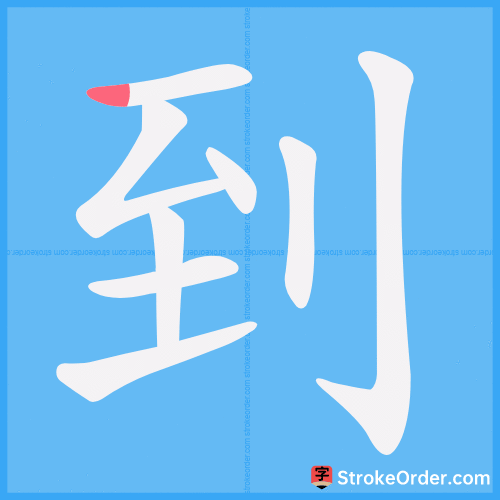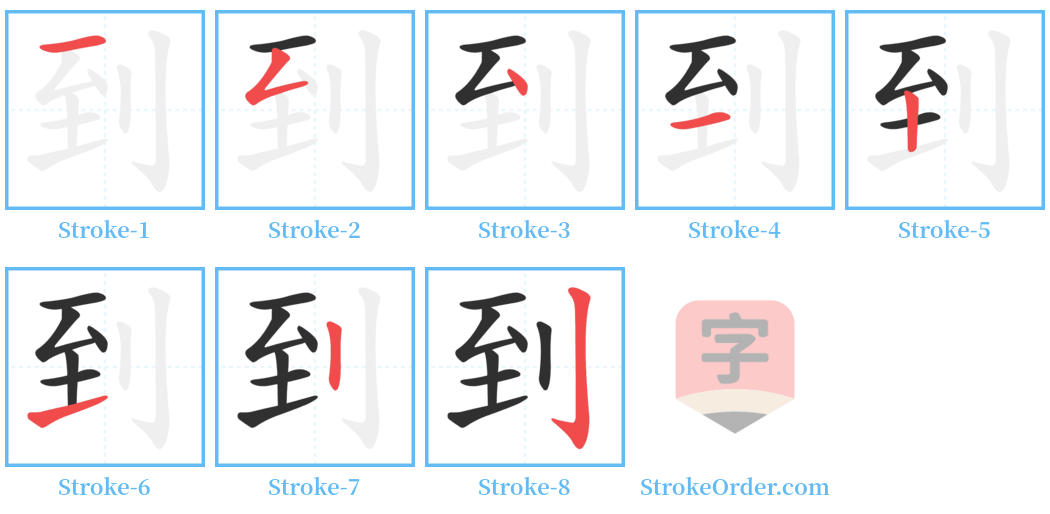到 Stroke Order
Animated Stroke Order of 到

Stroke Order Diagrams for 到

Step-by-Step Handwriting Guide for 到

Learn to Write Chinese Characters with Video Tutorials
Watch the video of writing the Chinese character "到", learn the correct stroke order (笔顺) of the character "到", and master the standard way of writing the character "到".
Free Printable Handwriting Practice with Stroke Order: 到
Printable Writing Practice Worksheet of "到" in Portrait Orientation (Tian Zi Ge)

Printable Writing Practice Worksheet of "到" in Landscape Orientation (Tian Zi Ge)

Information of 到
Pinyin
dào
Radical
刂
Strokes
8 strokes
Usage
★★★★★
Definition
to (a place) / until (a time) / up to / to go / to arrive
到 [dào]
1. 从别处来。
(1) Arrive from elsewhere: 到达 (arrive), 到站 (arrive at the station), 到来 (come), 到场 (arrive at the venue), 到任 (assume office), 到职 (take office), 到案 (present oneself), 签到 (sign in), 恰好处 (just right).
2. 往。
(2) Go to: 到群众中去 (go to the masses).
3. 周全,全顾得着。
(3) Considerate, attentive: 周到 (thoughtful), 面面俱到 (consider everything).
4. 成功。
(4) Succeed: 得到 (gain), 办到 (accomplish).
5. 姓。
(5) A surname.
动 [dào]
- 本义: 到达,达来,去到 (The original meaning: arrive, reach, go to).
- 造字法: 形声。从至,刀声 (Character formation: phonetic and semantic; "arrive" with "knife" sound).
- 同本义 (Same original meaning): arrive.
- 颠倒。通“倒” (Reverse; homophone with "倒" which means to turn upside down).
- 往 (Go to; leave for).
引:
1. 《说文》: 到,至也。 (Shuo Wen: 到 means to reach.)
2. 《诗·大雅·韩奕》: 靡国不到。 (Book of Songs: No country has not reached.)
3. 《战国策·齐策》: 虽隆薛之城到于天。 (Warring States Strategies: Even the grand city of Xue reaches the sky.)
4. 《水经注·江水》: 朝发白帝,暮到江陵。 (Shui Jing Zhu: Departing from Baidi at dawn, arrive at Jiangling in the evening.)
5. 《史记·滑稽列传》: 豹往到邺,会长老,问之民所疾苦。 (Records of the Grand Historian: The leopard went to Ye, met the elders, and inquired about the people's sufferings.)
6. 李斯《谏逐客书》: 功施到今。 (Li Si: The achievements have reached to this day.)
7. 宋·王安石《伤仲永》: 复到舅家。 (Song Dynasty: Wang Anshi: Again arrived at the maternal uncle's house.)
例:
又如:到时 (at the time), 飞机半夜到北京 (the plane arrives in Beijing at midnight), 官员到后,会议就开始了 (the meeting will begin after the officials arrive), 到头来 (in the end; result).
动 [dào]
- 同本义 (Same original meaning): arrive.
引:
1. 《庄子·外物》: 草木之到 (倒) 植者过半。 (Zhuangzi: More than half of the plants have been upside down.)
例:
又如:到植 (invert), 到三不着两 (disorganized; aimless).
3. 往 (Go to):
引:
1. 《乐府诗集·长歌行》: 百川东到海。 (Liang’s poetry: All rivers flow to the sea.)
例:
又如:到北京去 (go to Beijing).
助 [dào]
- 用作动词的补语,表示动作达到目的或有了结果。如:办得到 (can accomplish), 说到做到 (keep promises), 想到 (thought of).
介 [dào]
- 可作状语,介绍出动作的时间,表明动作到此时的状况 (can serve as an adverbial, introducing the time of action and indicating the state of action up to this point).
引:
1. 清·林觉民《与妻书》: 到那时使吾眼睁睁看汝死。 (Qing Dynasty: Lin Juemin, Letter to Wife: At that time, I will watch you die.)
形 [dào]
周到;周密 (Considerate; thoughtful).
如: 到地 (also known as 道地, thorough), 想得很周到 (thoughtful consideration).
to receive (praise, an education, punishment etc) / to be ...ed (praised, educated, punished etc)
Input Method for 到
Pinyin
dao4
Wubi
gcfj
Cangjie
mgln
Zhengma
hbkd
Four Corner
12100
Unicode
U+5230
Same Pronunciation Characters